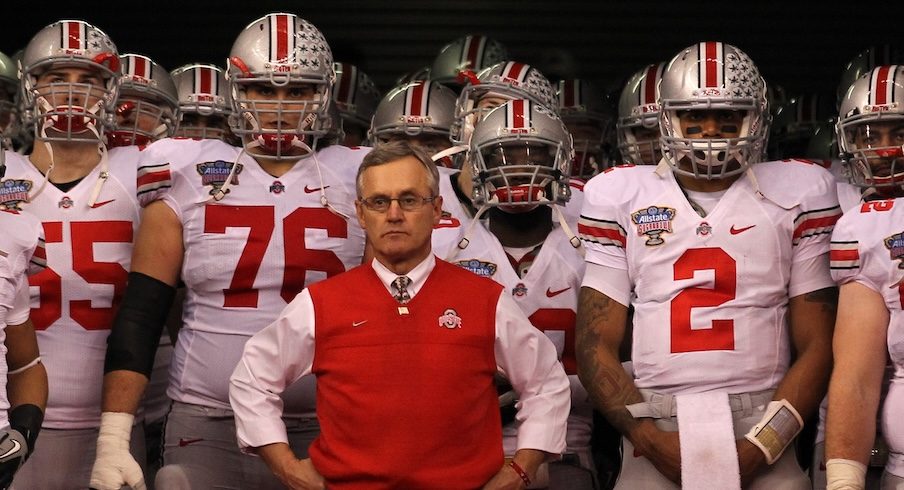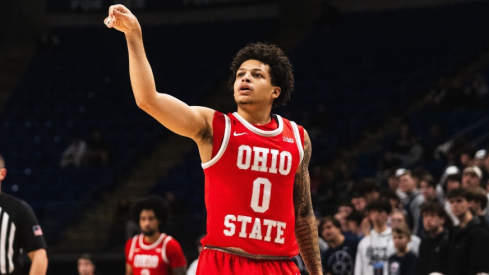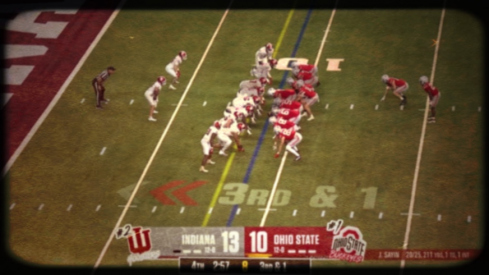Getting free tattoos in exchange for autographs was a worse crime than illegally scouting opponents in person. Or at least that’s how the NCAA’s punishments for those crimes make it appear.
Back in 2012, Ohio State was hit with the proverbial hammer when the Buckeyes were banned from the 2012 postseason – a year in which they would have made the Big Ten Championship Game and quite possibly the national championship game following a 12-0 regular season – due to the “Tattoo-Gate” scandal, which centered around five Ohio State players receiving free tattoos and selling team memorabilia. Ohio State received that punishment even after it agreed to vacate all of its wins from the 2010 season.
As such, the punishments Michigan received on Friday for its sign-stealing operation feel like a slap on the wrist.
Yes, Michigan was fined the equivalent of two years of postseason revenue, which is estimated to cost Michigan as much as $35 million. Jim Harbaugh received a 10-year show-cause penalty, Connor Stalions received an eight-year show-cause penalty and Sherrone Moore will be suspended for two games this season as well as one game next season. But the Wolverines won’t have to vacate any of their wins from the 2021-23 seasons, nor will they face any postseason ban.
Even though the NCAA confirmed that Michigan conducted an impermissible scouting scheme with the intent of gaining a competitive advantage over its opponents, the Wolverines still received a punishment that will be far less felt by their players than Ohio State did for players receiving improper benefits that made no impact on on-field play.
That comes as a result of the NCAA shifting away from postseason bans in recent years. While postseason bans used to be standard for programs that committed Level I violations, the NCAA adopted a new constitution in 2022 that states divisional regulations should ensure “to the greatest extent possible that penalties imposed for infractions do not punish programs or student-athletes not involved nor implicated in infractions.” In its announcement of Michigan’s sanctions on Friday, the NCAA said Michigan’s status as a repeat violator coupled with its Level I-Aggravated case classification was “sufficient grounds for a multiyear postseason ban,” but that the NCAA didn’t want to “unfairly penalize student-athletes for the actions of coaches and staff who are no longer associated with the Michigan football program.”
It’s a logical change in policy for an organization that has gradually moved away from heavy-handed punishments as its power has decreased from a variety of legal challenges. But that won’t assuage Ohio State fans who remember the Buckeyes being prevented from competing for championships 13 years ago due to benefits received by five players who were no longer on the team and withheld information by a coach who was no longer with the team.
The lack of vacated wins makes Michigan’s penalties feel even lighter when compared to other recent NCAA scandals. To that point, Committee on Infractions chief hearing officer Norman Bay said win vacation was never considered because the NCAA’s policy is to only vacate wins in infractions cases that involve ineligible players (though that wasn’t always the case, as Penn State had 14 years’ worth of wins vacated for the Jerry Sandusky child sexual abuse scandal, though those wins were later restored).
In the modern era of college sports, in which money is a bigger factor than ever before, the financial sanctions against Michigan certainly shouldn’t be overlooked. The fact that Michigan is appealing the penalties even without a postseason ban or vacated wins speaks to the impact of that lost revenue, and the Committee on Infractions believes the penalty will serve as a deterrent to others who might think about trying to cheat.
“I think the penalty here was very significant,” Bay said during the Committee on Infractions’ press conference on Friday. “I think it was meaningful, and I think it sends a message to the membership that these rules matter, that having a compliance program and strong culture of compliance matter, and that schools and individuals that fail to comply will be held accountable.”
That said, the penalties don’t have much direct impact on what Michigan has already accomplished on the football field or what it could accomplish this season or in future seasons. All the games it won with the assistance of its impermissible scouting operation still count, and it won’t miss any postseason games as a result of the sanctions. Even the recruiting restrictions levied against Michigan – a 25% reduction in official visits this year and a 14-week ban on recruiting communications – aren’t likely to make a major dent in Michigan’s recruiting efforts for the year ahead, especially since they weren’t paired with any reduction of scholarships or roster spots (Ohio State, on the other hand, lost five scholarships over three years for Tattoo-Gate).
Ohio State is far from the only program that’s had to serve a postseason ban and/or vacate wins for transgressions that took place off the field. Most notoriously, SMU received the “death penalty,” forcing the Mustangs to cancel their 1987 season entirely among other punishments, for paying players and academic fraud. USC was forced to vacate its 2004 national championship and all of its 2005 wins and serve a postseason ban in 2010 and 2011 – more than five years after the actual violations occurred – because Reggie Bush received improper benefits. Ole Miss had to vacate 33 wins over six seasons and serve a two-year postseason ban in 2017 and 2018 due to recruiting violations committed by former coaches Hugh Freeze and Houston Nutt.
All of those past punishments make Michigan’s sanctions feel thin by comparison, even if it appears the NCAA’s days of handing out postseason bans are over. While Michigan’s violations included a direct attempt to gain an advantage on the field through prohibited means, its penalties levy a much smaller impact on Michigan’s on-field past and future than other high-profile college football scandals that took place away from the field of play.


